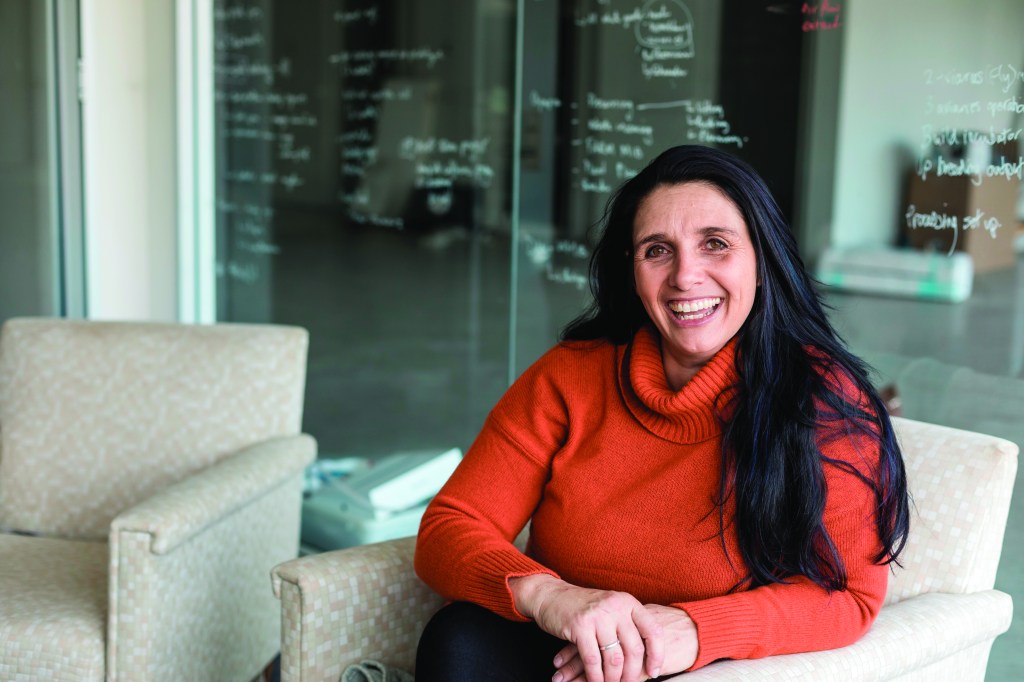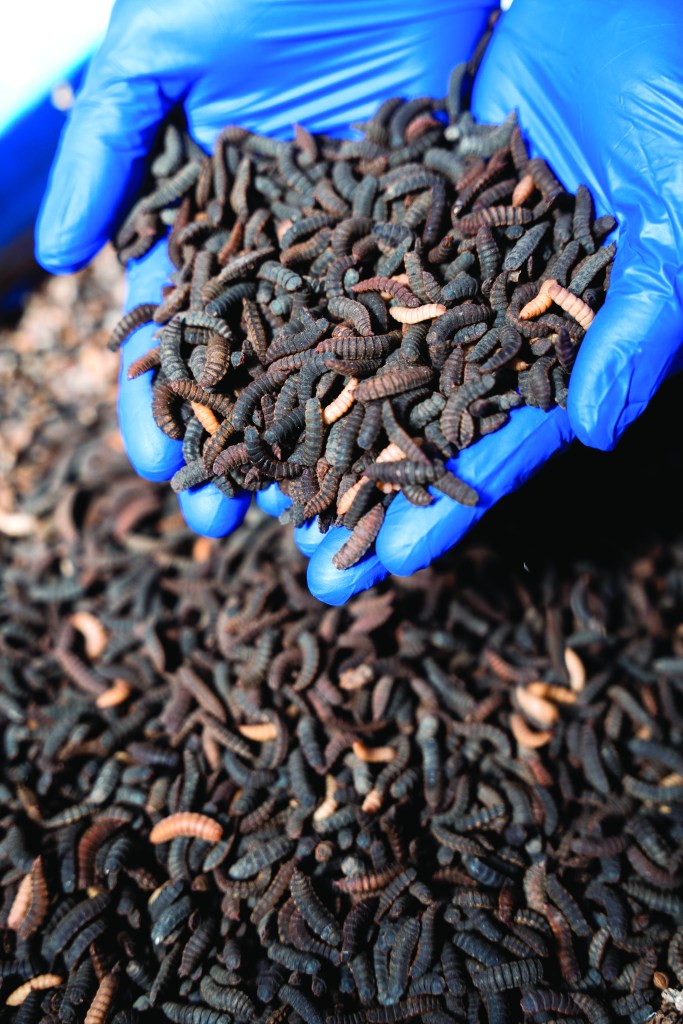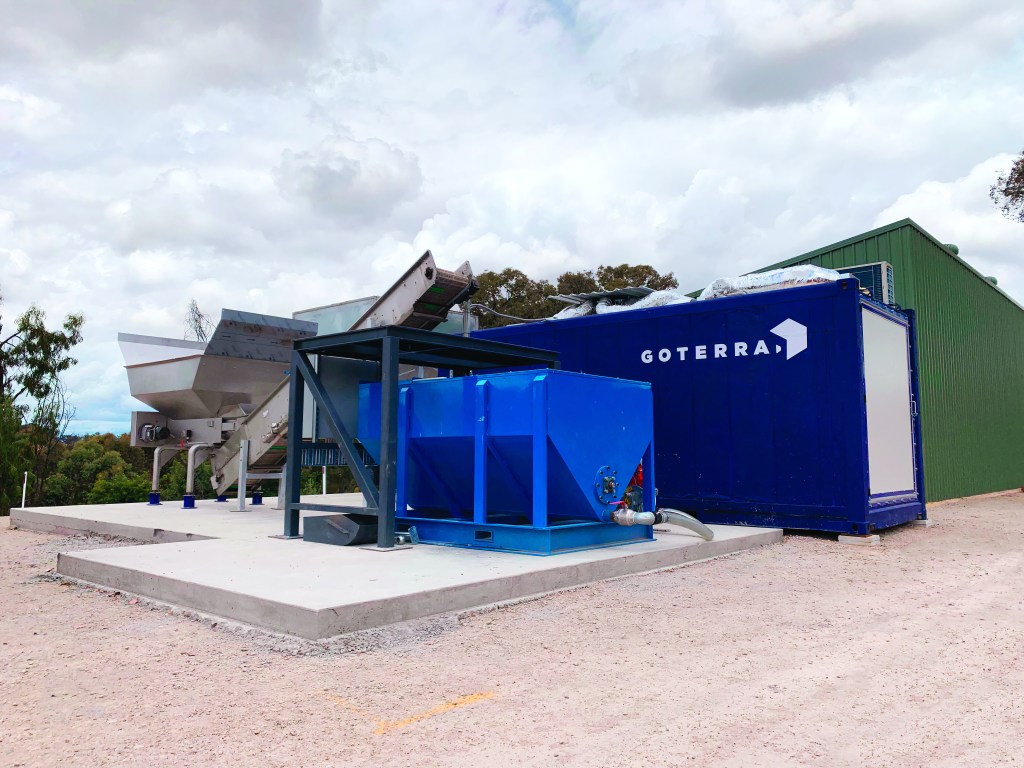Olympia Yarger is the founder of Goterra, a biotech business aiming to kill two birds with one maggot (or thousands of them). Yarger’s colony has so far processed more than 35,000 tonnes of food waste and raised more than $9 million.

Olympia Yarger is a farmer. Not of cattle or sheep, but maggots. And if you ask her if that’s the kind of career she envisioned herself having, she’d laugh hysterically.
“No! I wanted to be working with sheep, man. I wanted to make wool jumpers, be married to some big-jaw-boned dude named Brendan, and have a litter of Kelpie dogs,” she says. “Instead, I’m married to an American marine who wears tie-dyed T-shirts, listens to Slipknot, and works from home in shorts – and I’m a maggot farmer.”
Yarger is the founder of an agri-tech startup, Goterra (a combination of the word maggot and Canberra, where she lives). Goterra launched in 2016 intending to kill two birds with one maggot – or, actually, thousands of them.
“We have seven years left in a decisive decade, and we have a lot of work to do.”
– Olympia Yarger, founder of Goterra
One bird is Australia’s food waste crisis: We waste nearly 7 billion tonnes of food each year. The other is the cost of feeding livestock: 70% of livestock production costs are attributed to feed (protein grown or developed to feed animals). Since its launch, Goterra has raised more than $9 million to fight the good fight.
The idea was simple: “Feed maggots food waste, so your food is not drawing on the animal supply chain. Then make protein to put back into the supply chain.”
“I wasn’t making the idea up,” she says, recalling that others in the industry knew insects could solve the feed cost crisis. “But the bigger my [maggot] colony got, I kept trying to feed it, and I was coming into the same problem as feeding in any kind of agriculture – 70% of my production costs became about feeding the maggots.”

“Where I changed direction from my peers was, I realised we’re in a waste management business instead,” she says.
But that was easier said than done. Yarger would learn that getting food waste from businesses is much more complex than you’d think. The next light bulb appeared: if you can’t take the food waste to the maggots, you’ll need to take the maggots to the food waste.
So, Yarger designed an industrial insect farming robot to house maggots (larvae of the black soldier fly). It’s transportable and modular, which means it can be directly taken to a business. The business empties its food waste into the robot, which then feeds it to the maggots. Like a worm farm, the maggot’s excretions become fertiliser (frass, to be specific). The robot also manages the interior’s climate and air quality so the maggots are in the optimal environment to consume the most food waste possible.

With the designs set, Yarger needed capital to follow through. In 2018, she raised $1.2 million in a seed round led by Grok Ventures. Two years later, the company had a TRL (technology readiness level) 6 prototype (where 9 is the highest level of readiness) and signed its first enterprise customer.
It needed more cash to deliver.
By the end of 2020, Goterra had managed to raise a further $8 million, again led by Grok Ventures, and had a commercial TRL 9 robot ready and deployed, thanks to the help of a team of engineers and scientists who helped Yarger bring it to life. Since then, the company’s systems have processed more than 35,000 tonnes of food waste and saved more than 60,000 tonnes of carbon emissions.
With the company gaining more traction, the plan is to raise more capital.
“We have seven years left in a decisive decade, and we have a lot of work to do,” she says. “And so we’re going to do the work.”
Was this Yarger’s lifelong dream? Perhaps not.
“But I would not trade this for anything else, to be fair.”
What’s the problem?
Problem 1:
- 70% of all production costs are related to feed (food grown or developed for livestock and poultry)
- Feed costs have increased 40-60% in the last two years as markets have become more volatile
- These rising costs are often absorbed by livestock and poultry producers
Problem 2:
- Australia wastes 7 million tonnes worth of food each year
- Around 5 million tonnes of that is actual waste that cannot be reused or recycled – and needs to be managed.
What’s the solution?
- In short: maggots
- Goterra’s robots are stationed at businesses that create more than one tonne of food waste a day on their own (think: Sydney’s Barangaroo Towers, Cleanaway, Veolia)
- The company’s food waste is directed toward the robots
- The maggots inside are fed the food waste and, in turn, produce frass – a type of insect manure that is extremely high-value (high in nitrogen, phosphorus and potassium) – fertiliser
- Goterra collects the fertiliser
- This fertiliser is sold to farmers or plant nurseries, pet shops or aquiculture as feed
- The maggots themselves can act as protein for livestock, too. They can also be separated into the sum total of their parts (oil chitin, melanin and protein).